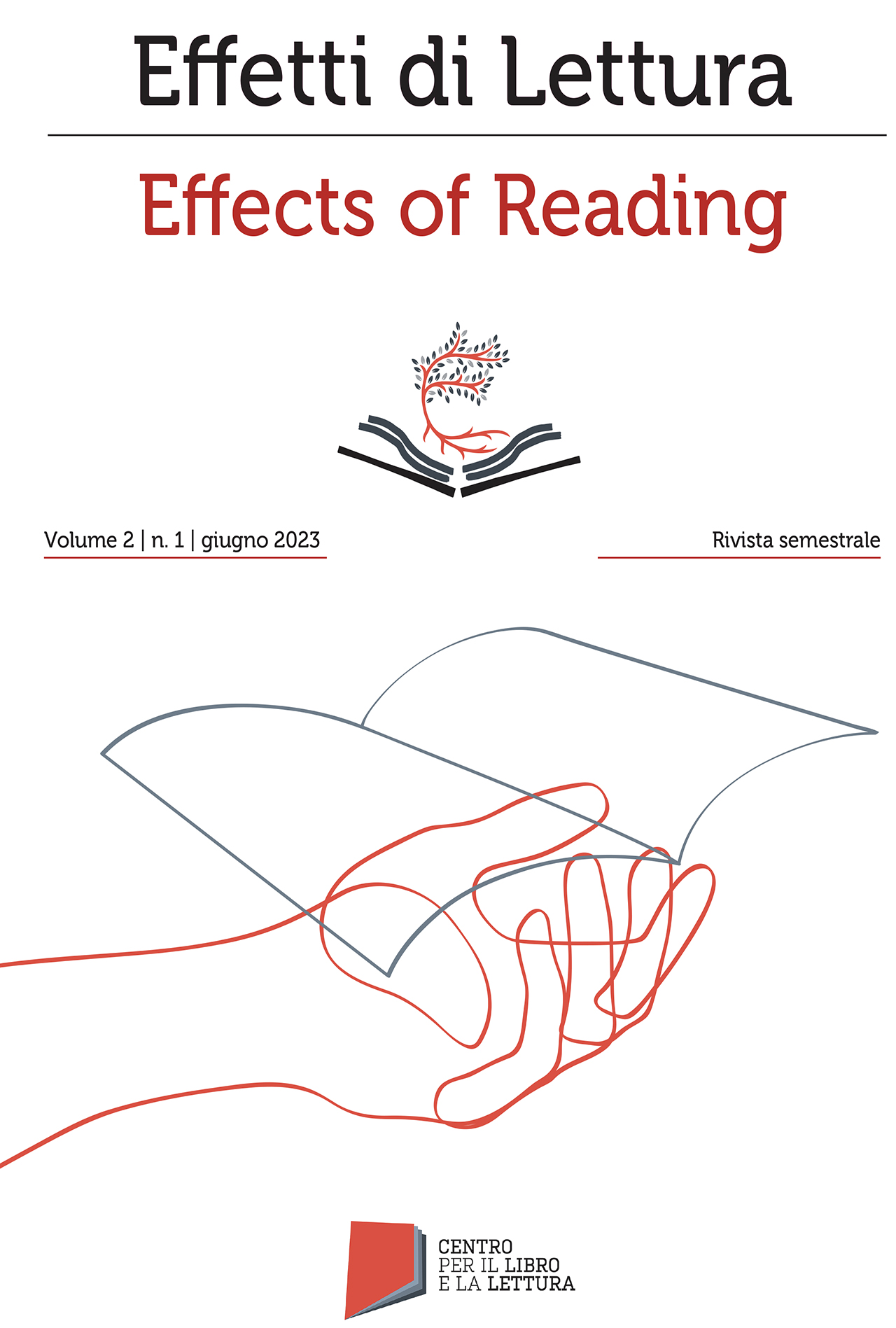The Erasmus+ project "EU-Reading Circles" experience in Abruzzo. The reading group as a strategic element of the educational community
DOI:
https://doi.org/10.7347/EdL-01-2023-05Keywords:
Promoting reding, inclusion, reading groups, community educationAbstract
The reading group, a methodology for promoting reading experienced mainly in non-formal contexts, is configured as a free, social and participatory experience linked to text sharing and negotiation of meaning, capable not only of enhancing deep reading skills, but also to develop the social and citizenship skills of the subjects involved. From a theoretical and practical point of view, the reading group is configured as a space characterized by a constant tension between the individual and social dimensions (Gavazzi, 2019). Intrinsically connoted in educational terms, the reading group is based on the practice of shared reading, which develops according to relational, participatory and social trajectories, recognizing the negotiation of meanings as a characterizing aspect (Di Carlo, 2021). With a view to promoting reading and combating educational poverty in the territories, the Erasmus+ EU-Reading Circles project has identified in the reading group a transformative device for intervention in communities for the promotion of literacy, an essential objective for the prevention of exclusion cultural and social. The project, which took place between 2020 and 2023, involved universities, libraries and associations from Spain (lead partner), Italy, France, Greece and Poland. EU-Reading Circles has identified an innovative strategic choice in the active involvement of the educational community. The experience that has developed in Abruzzo, thanks to EU-Reading Circles, calls for an analysis of the "reading circle" as an incubator of connections between school and territory, as well as a space for the exchange of experiences and good practices between subjects who identify reading group the design feature of an engaged educating community, with a view to the co-responsibility of the various local training agencies, in the creation of more literate and inclusive environments.
Downloads
References
Associazione Italiana Editori. (2019). Sfida al futuro: la lettura e la capacità di competere del Paese. Materiali di discussione. Milano: Ediser srl.
Chambers, A. (2011). Siamo quello che leggiamo. Crescere tra lettura e letteratura. Modena: EquiLibri.
Conclusioni del Consiglio del 12 maggio 2009 su un quadro strategico per la cooperazione europea nel settore dell'istruzione e della formazione («ET 2020») (28 maggio 2009). https://eur-lex.europa.eu/legal-content/IT/TXT/PDF/?uri=CELEX:52009XG0528(01)&from=IT.
Consiglio europeo di Lisbona 23 e 24 marzo 2000. Conclusioni della Presidenza (23 e 24 marzo 2000). https://www.europarl.europa.eu/summits/lis1_it.htm#a.
Di Carlo, C. (2021). Gruppo di lettura. Roma: Associazione Italiana Biblioteche.
Directorate – General for Educarion. Youth, Sport and Culture (European Commission). (2014). EU high level of experts on literacy. Final report, September 2012. https://op.europa.eu/en/publication-detail/-/publication/96d782cc-7cad-4389-869a-bbc8e15e5aeb.
Ferrieri, L. (2006). La lettura condivisa. Alcune ipotesi di lavoro. In Presentazione alla conferenza Se son gruppi leggeranno. La lettura condivisa. http://laletturanonostante.it/wp-content/uploads/2019/06/La-lettura-condivisa.-Relazione-per-Arco.pdf.
Ferrieri, L. (2012). Il lettore “comune” e la lettura in comune. Biblioteche oggi, 30(12), 25-37.
Gavazzi, L. (2019). I gruppi di lettura. Come, dove e perché leggere insieme. Milano: Editrice Bibliografica.
Gavazzi, L. (2023). Le voci dei lettori. Come creare (e condurre) un gruppo di lettura inclusivo. Milano: Editrice Bibliografica.
Mortari, L. (2006). La pratica dell’aver cura. Milano: Bruno Mondadori.
Mortati, L. (2008). Educare alla cittadinanza partecipata. Milano: Bruno Mondadori.
Roveda, A. (2015). Educazione alla lettura, questione speciale. Andersen, XXXIV(320), 9.
Sannipoli, M. (2019). Le povertà educative tra condizioni e situazioni: verso una possibile lettura coevolutiva. In M. Amadini, S. Ferrari, & S. Polenghi (A cura di), Comunità e corresponsabilità educativa. Soggetti, compiti e strategie (pp. 95-106). Lecce: Pensa MultiMedia.
Spoldi, R. (2006). Gruppi di lettura: un’occasione da non perdere. Biblioteche oggi, 24(7), 23-27.
Tramma, S. (2015). Pedagogia della contemporaneità. Roma: Carocci.
Ufficio Studi e Analisi. Agenzia Nazionale Erasmus+ Indire. (2020). Erasmus+ in breve. Cooperazione per l’innovazione e lo scambio di buone pratiche nell’educazione degli adulti. Call 2020. https://www.erasmusplus.it/wp-content/uploads/2021/09/Erasmus_in-breve_KA2_EDA_2020.pdf.
Wenger, E. (2006). Comunità di pratica. Apprendimento, significato e identità. Milano: Raffaello Cortina.
Zizioli, E. (2017). I tesori della lettura sull’isola. Una pratica di cittadinanza possibile. Roma: Sinnos.
Downloads
Published
How to Cite
Issue
Section
License
Copyright (c) 2023 Effetti di lettura / Effects of reading

This work is licensed under a Creative Commons Attribution-NonCommercial 4.0 International License.








